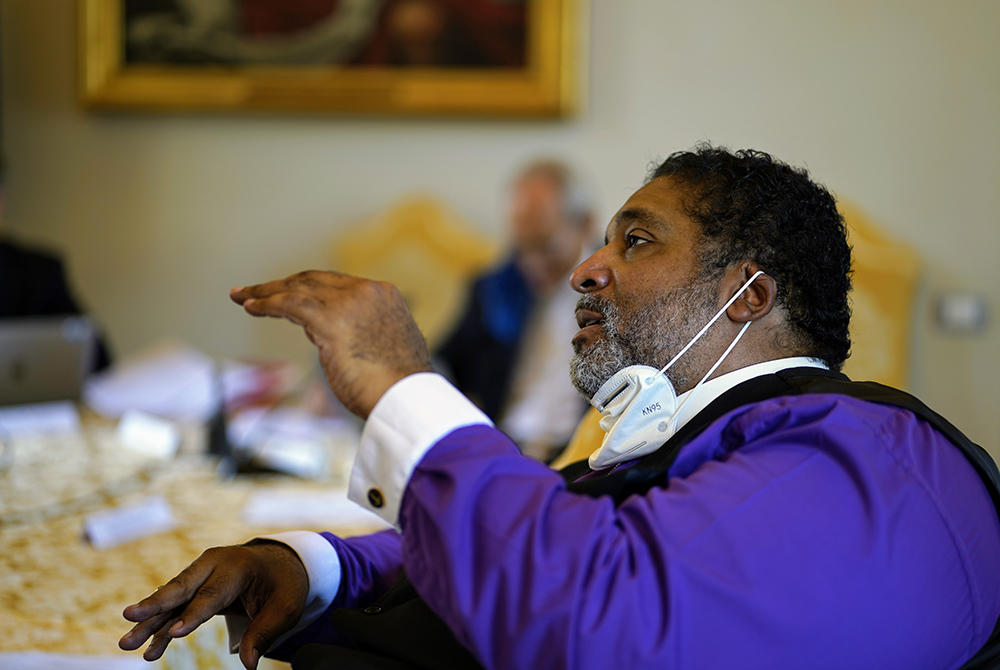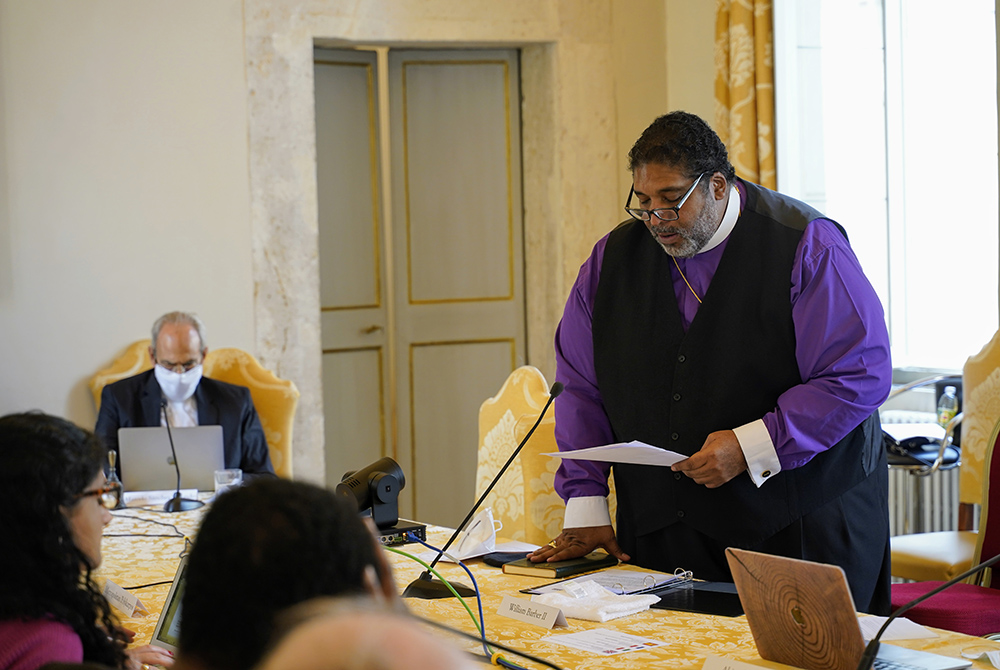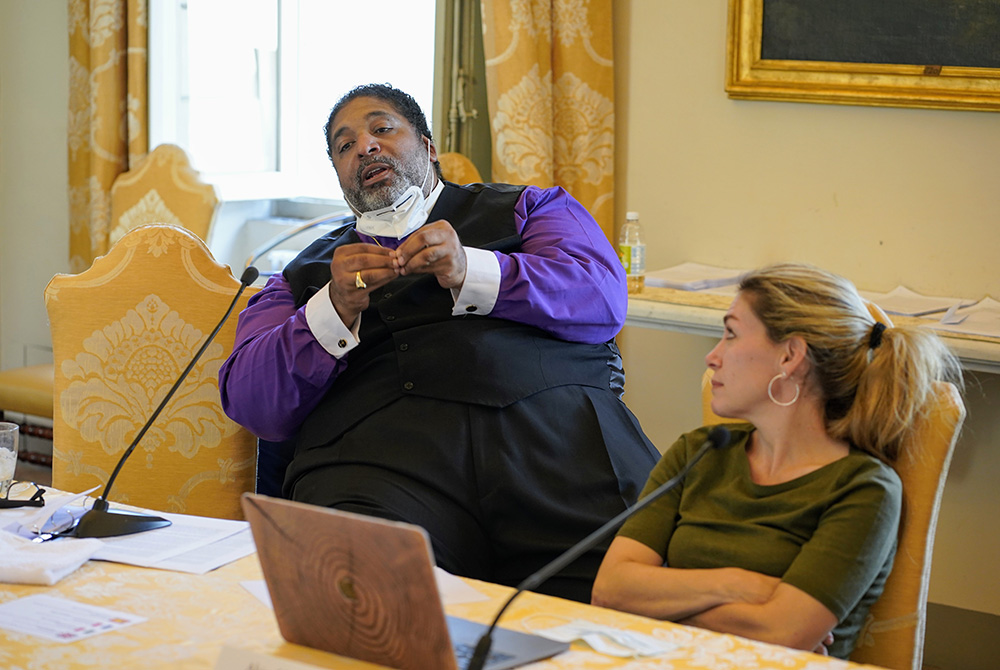
The Rev. William Barber II, a Protestant minister and co-chair of the Poor People's Campaign, speaks Oct. 4 at the Vatican. (Courtesy of Gabriella Clare Marino)
One of the United States' leading anti-poverty crusaders, who is a regular presence at national political conventions and at the U.S. Capitol, took to a new pulpit this week at the Vatican to make his case for building a "moral movement for a moral economy."
But for the Rev. William Barber II, a Protestant minister and co-chair of the Poor People's Campaign, the storied location of the Vatican's Casina Pio IV, home of the Pontifical Academy of Sciences and whose history is traced back to Galileo Galilei, location was not what mattered most.
"I think one of the things the pope understands is it's not so much what is the power of the Vatican, but what is the power of a moral call to mobilize the world and particularly the poor of the world and moral and religious leaders," he told NCR on Oct. 5.
Barber's participation in an Oct. 3-4 conference on ending poverty happened to coincide with the one-year anniversary of Pope Francis' 2020 encyclical Fratelli Tutti, which called for greater social solidarity and offered a stinging criticism of trickle-down economics.
At the Vatican, Barber echoed that pope's words from his encyclical letter.
"We agree with the Holy Father in Fratelli Tutti that so-called market values that put profit above the lives of people are deadly and threaten the natural world itself," he said in his speech. "In simplest terms, we know that the way things are is not the way things have to be."

The Rev. William Barber II, a Protestant minister and co-chair of the Poor People's Campaign, speaks Oct. 4 at the Vatican. (Courtesy of Gabriella Clare Marino)
When it comes to economic justice, the head of the world's 1.3 billion Catholics and the Disciples of Christ minister have a strikingly similar message.
A recurring theme found in Francis' speeches and letters is that "everything is connected." For Barber, he uses a similar formulation of "interlocking injustices" to discuss "systemic poverty; racism; ecological devastation, denial of health care and housing; a war economy; and the distorted moral narrative of religious nationalism," which he believes must be addressed simultaneously.
And like the pope, who has made ecumenical and interfaith partnerships a signature component of his papacy, Barber believes moral and religious leaders must work together — quickly and resolutely.
"Whether it's the ending of slavery and the abolition movement, the early labor movement in the United States and around the world, whether it's bringing down of apartheid and challenging colonialism in Africa, you can't find anywhere where there was not in the midst of that some deep, transformative moral movement," he said in an interview.
Advertisement
"We cannot continue like this," he continued, describing the state of the world's economy. "You cannot have one-tenth of the world having more than they ever could, built on the backs of other people."
Barber has a range of statistics at his disposal that help make this case: There are more than 1 billion people living in extreme poverty, 140 million of whom are in the United States. Another 8 million people fell into poverty during the COVID-19 pandemic, while at the same time, more than 80% of COVID relief went to corporations and billionaires made nearly $2 trillion.
"This is a moral spiral towards death," he told NCR. "It is morally indefensible, constitutionally inconsistent and economically insane."
He went on to note that the Vatican conference did not mince words about the current predicament. Along with the Beatitudes, he said the words of the prophet Isaiah were "prominent" in their proceedings: "Woe to those who legislate evil and rob the poor of their rights, and make women and children their prey."
"In other words, we're sowing our own destruction," said Barber. "And part of the role of the church is to offer a way out."

The Rev. William Barber II, a Protestant minister and co-chair of the Poor People's Campaign, speaks Oct. 4 at the Vatican. (Courtesy of Gabriella Clare Marino)
During his speech at the Vatican, Barber specifically called out political leaders who use religion to fuel populist and nationalist sympathies, something Pope Francis criticized most recently during his trip to Hungary and Slovakia in September.
"Religious nationalism today presents an existential threat to poor people because it offers theological and spiritual cover for a policy agenda that treats corporations like people and people like things," Barber said at the Vatican. "To build a moral movement for a moral economy, a diverse and prophetic witness of religious leaders must stand in the gap and challenge the policy violence that religious nationalists endorse."
When asked about these concerns, the evangelical Barber took to the words of another Catholic to make his case, paraphrasing the words of "the holy martyr" St. Óscar Romero that "anything that destroys the dignity of humanity is offensive to God."
"Whenever religion is used in the service of those things that destroy the dignity of humankind, it is in fact a form of theological malpractice," he said. "And heresy at worst."








